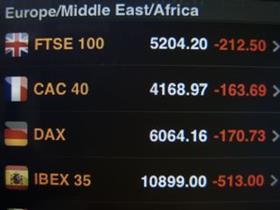
The ongoing turmoil in global stock markets, which has brought us the remarkable sight both of governments coming to the rescue of some of the world’s biggest banks as well as the sudden disappearance of some famous old names on Wall Street and elsewhere, has lessons for anyone who operates in markets, not least those of us who work in the fresh fruit and vegetable business.
The “Credit Crunch”, a new coinage in the English dictionary that has been written about here before and consumed many more column inches elsewhere, is founded on a number of facts. For most of us, these facts are almost impossible to comprehend, especially when they seem so far removed from daily life where most financial encounters start and finish in the queue at the local supermarket.
If I’ve got it right, the latest crisis boils down to the fact that some very big banks have stopped extending credit to the likes of you and me and to each other because they’ve had their fingers and much more very badly burned as a result of extending far too much credit to every other Tom, Dick and Harry out there. More problematically, they’ve then traded these debts among themselves, only to discover that they’ve got a mighty big problem when the debts can’t be repaid. Enough already.
Aside from the sequence of bewildering events in this 21st century version of the notorious Wall Street Crash of the late 1920s, the facts of this latest crisis show that there a few home truths that even your most humble fresh produce trader could teach a city financier: don’t trade with someone you don’t trust, don’t sell what you don’t have, don’t talk up a product you know is no good, don’t try to beat the market, and don’t forget the market goes up as well as down.
The best fresh fruit and vegetable businesses prosper because they’ve learned a basic set of rules by which they operate and then they keep themselves refuelled with the optimism that tells you next season is always going to be better than this one.
The best businesses are those that are best equipped to cope with the sharp changes in volumes that every new season brings as well as to take advantage of the sudden surges or shortages that come through the course of a season. They’re also better attuned to meet the changing demands of consumers who buy or sometimes don’t buy what’s on offer on supermarket shelves. And, nowadays, the best businesses are those that understand best their major customers, that is to say the big supermarkets.
Shoppers react in some very predictable and unpredictable ways. Like stock markets, their actions are often driven by sentiment and more often than not the most single most important requirement for success is your ability to manage the impact that these changes in sentiment have on your business. After all, their actions determine the manner in which markets behave. As the last few weeks have shown us, they’re sensitive things. “On a scale of one to 10, this market is at 13!” remarked one Wall Street trader last month. A lesson for us too?



